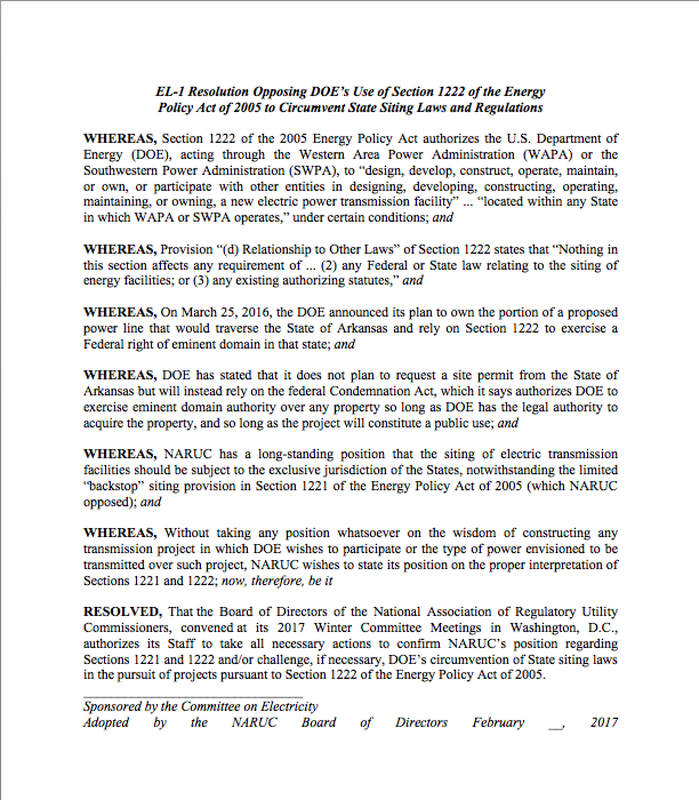Such as this bit of fearmongering:
“My fear of that is the precedent it would set within the state of Missouri for any future developments,” Klusmeyer said.
Any utility system in the state, whether it’s water, sewer, electric or telecommunications, has the power of eminent domain, Klusmeyer said. The bill could be construed to limit the use of eminent domain for “pretty much any utility in the state,” he said, even though it’s limited to “above-ground merchant lines.”
“That can trickle down into just about any type of utility expansion that’s done, whether it’s through Missouri American, or maybe even Ameren or Associated (Electric Cooperative),” he said. “That’s my fear of what it’s going to do to any type of infrastructure improvement or expansion in the state.”
Private entities shall not have the power of eminent domain under the provisions of this section for the purposes of constructing above-ground merchant lines. For the purposes of this subsection, "merchant line" means a high-voltage direct current electric transmission line which does not provide for the erection of electric substations at intervals of less than fifty miles, which substations are necessary to accommodate both the purchase and sale to persons located in this state of electricity generated or transmitted by the private entity.
The bill, introduced by Rep. Jim Hansen, R-Frankford, would prohibit taking easements by eminent domain to make way for the Grain Belt Express, a planned $2.3 billion transmission line, which Chicago-based Invenergy bought last year. The line would carry electricity from the Iron Star wind farm in southwestern Kansas, across Missouri and Indiana, and into Illinois. The line would cross eight north Missouri counties, including Monroe and Ralls, which are represented by Hansen.
Targeted at the Grain Belt Express, the bill would also apply to similar projects. It bans all private entities from using eminent domain to acquire easements to build “above-ground merchant lines” if less than 12 percent of the power will be consumed by Missouri customers.
Chicago-based Invenergy did not buy the project last year. It signed a contingent contract to purchase if certain conditions are met. Invenergy does not yet own the project.
The line is proposed to carry electricity from a proposed converter station in southwestern Kansas, although no specific wind farms have signed on to be customers. Any wind that wants to connect would have to sign a contract to purchase capacity. That hasn't happened yet. In addition, the project has no clear path through Illinois to Indiana, so it is not guaranteed to connect to anything. GBE does not have a permit to construct the project in Illinois. In fact, it has not even applied for one.
There are no other "similar" projects.
And that 12% figure is not in the legislation, but came from legislative public hearings where proponents of the bill mentioned that less than 12% of the electricity planned for this project could possibly be for sale to Missouri utilities. The legislation contains no such threshold.
So, what was the point of spewing misinformation such as this to news reporters on a conference call?
Fearmongering.
And then there's this logic bender:
The Federal Energy Regulatory Commission has the power to regulate transmission, not the state legislature, said Mark Petty director of Kirkwood Electric. Every transmission project can be difficult for landowners to grapple with, which is why they are considered by a commission rather than elected officials who haven’t been reviewing all the facts, he said.
“It’s easy for an entity that objects to want to do an end run, even after all the other facts have been presented and laws been interpreted and reviewed,” he said.
Mark also said this:
Since the electricity is still coming to customers through public utilities, customers will have the same low rates and price stability, Petty said. The wind electricity from the Grain Belt Express is also cheaper than the alternatives, and Kirkwood could save up to a third of what it currently pays for electricity, Petty said.
Cities served by the public energy pool will also see savings, but not as large as Kirkwood. Each city would save about 3-4 percent, said John Grotzinger, vice president of engineering operations and power supply at the Missouri Public Utility Alliance. Those savings would be passed on to ratepayers, he said.
HB 1062 has incredible support. Use of fearmongering and misinformation to prevent its passage is a losing game. Or maybe these city utilities and public energy pool folks really believe their own nonsense and have been taken for a ride by out-of-state investors seeking to increase their own profits on the backs of Missourians? When someone offers you something at below their cost to supply it, there's always a catch. Perhaps this is the real reason cities are nervous? Their golden goose is on the chopping block!
May truth, logic and good sense prevail!







 RSS Feed
RSS Feed